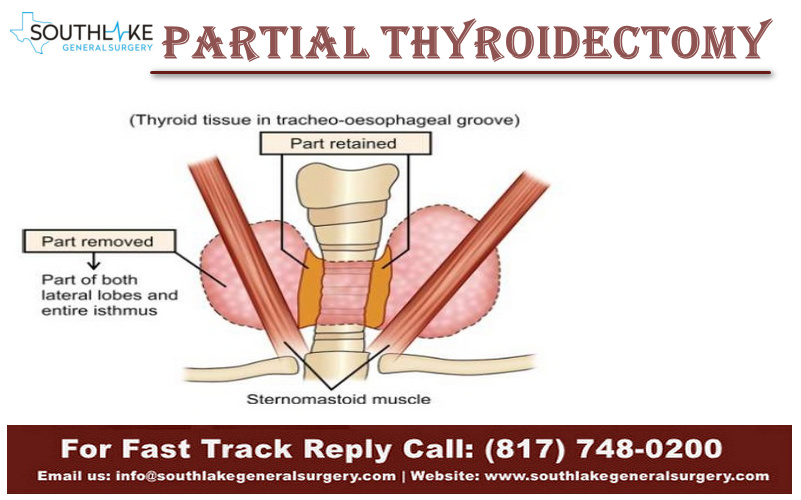The thyroid is a small-sized, butterfly-shaped gland located in the lower part of the front of the neck. Thyroid gland removal is a surgery that includes eliminating part (partial thyroid) or the entirety of the thyroid.
The thyroid has a significant role in the body’s functionality. It produces hormones that circulate all throughout our body, directing an individual’s temperature and metabolism.
It likewise helps the heart and digestive system and keeps up muscle control and bone health. Our Dr. Valeria Simone MD at Southlake General Surgery, Southlake, Texas recommends thyroid removal surgery for many reasons. That may include:
An individual is destined to go through thyroid removal surgery if:
- A nodule on the gland is cancerous or may get cancerous. Thyroid nodules are generally benign, yet a surgeon will take a biopsy to check.
- A thyroid nodule or the entire gland is grown from its normal size and causes hazardous or troublesome side effects, for example, trouble swallowing, trouble breathing, or changes to the voice.
- An individual has an overactive thyroid (hyperthyroidism) that doesn’t react to any treatment. Graves’ disease or toxicity in at least one or more nodules can lead to hyperthyroidism.
Types of Thyroid disorders
There are a couple of reasons for thyroid removal surgery. Our surgeon will conclude, subsequent to thinking about the scope of variables, including the state of the thyroid and an individual’s general health.
Following are the types of thyroid removal surgery which include:
- Hemithyroidectomy, or lobectomy. This includes eliminating one lobe (or half) of the thyroid. Our surgeon may suggest this medical procedure if a nodule or low-risk thyroid cancer is restricted aside from the thyroid.
- Isthmusectomy: This medical procedure eliminates the isthmus, a bit of tissue that associates the two lobes of the thyroid. Small tumors on the isthmus may just require an isthmusectomy.
- Total thyroidectomy: This includes eliminating the whole thyroid gland. In a few instances of thyroid cancer, respective thyroid nodules, and Graves’ disease require a total thyroidectomy.
How to prepare for Thyroid Surgery?
Our surgeon will advise a few guidelines to an individual about how to plan for thyroid removal surgery. This generally includes not eating or drinking for a set period before the surgery.
Thyroid removal surgery happens under general anesthesia, so an individual will be sleeping and won’t feel any pain.
More often than not, the surgeon will start by making a small incision on the neck, taking into consideration maintaining a strategic distance from the vocal lines and windpipe. The medical procedure will last around 2 hours.
An individual can return home around the same time as the medical procedure. The surgeon may recommend the patient to stay overnight at the hospital based on the health condition.
What are the Symptoms and Risk Factors of Thyroid Surgery?
If a surgeon has many years of practice experience to perform thyroid removal surgery, the danger of serious complexities is very rare. Nonetheless, all medical procedures include some risks.
Risks factors of thyroid removal surgery include:
- infection
- bleeding, that happens in the initial few hours after surgery
- injury to the nerves that control the voice box
- injury to a parathyroid gland
All four parathyroid glands help maintain the calcium level in the blood.
Post total thyroidectomy, our surgeon will screen parathyroid hormone and calcium levels to identify any requirement for calcium or Vitamin D supplementation. Any symptoms of a low level of calcium in the blood lead to numbness and tingling sensations or muscle cramps.
Another potential intricacy is that an individual should take a thyroid hormone replacement prescription.
If the entire thyroid is removed by the surgeon, an individual will require hormone replacement for their entire life. This may include, levothyroxine (Synthroid), a synthetic variant of the thyroid hormone. The surgeon will prescribe the dosages based on the individual’s weight.
If the surgeon performs partial thyroid surgery, there is a high possibility of the gland will start producing an adequate amount of hormone and an individual may not require a replacement prescription.
In any case, if the thyroid gland was underactive (hypothyroidism), and an individual was at that point taking thyroid hormone substitution, they will probably need to keep taking it after a medical procedure.
Recovery After Thyroid Removal Surgery
The vast majority can resume their regular activities the day after thyroid removal surgery with few precautions such as avoiding physical exercises or sports for a couple of days or weeks, or until the surgeon recommend to start.
An individual will probably have a sore or sensitive throat for a couple of days. Over-the-counter pain relievers, for example, acetaminophen or ibuprofen, may reduce the pain. In the event that the pain is unbearable and severe, you need to contact your surgeon immediately.
Post-surgery, the surgeon may screen your thyroid hormone and calcium levels to examine for hypothyroidism or hypoparathyroidism.
An individual should consult with their surgeon if experiences dryness in their voice or trouble breathing.
Viewpoint
Thyroid removal surgery can treat a scope of issues. An individual may go through the surgery in the event that they have nodules or goiters on their thyroid, harmful nodules, Graves’ disease, or thyroid cancer.
The risk of complexities is low, yet an individual may need to take thyroid hormone replacement prescriptions throughout their life. Your surgeon will brief you on the best way to plan for the surgery and instructions for smooth recovery.
Appointment
For more information on Partial Thyroid Removal Surgery and Recovery, please contact our health care expert today at +1(817) 748-0200. You can also make an online appointment with us.

